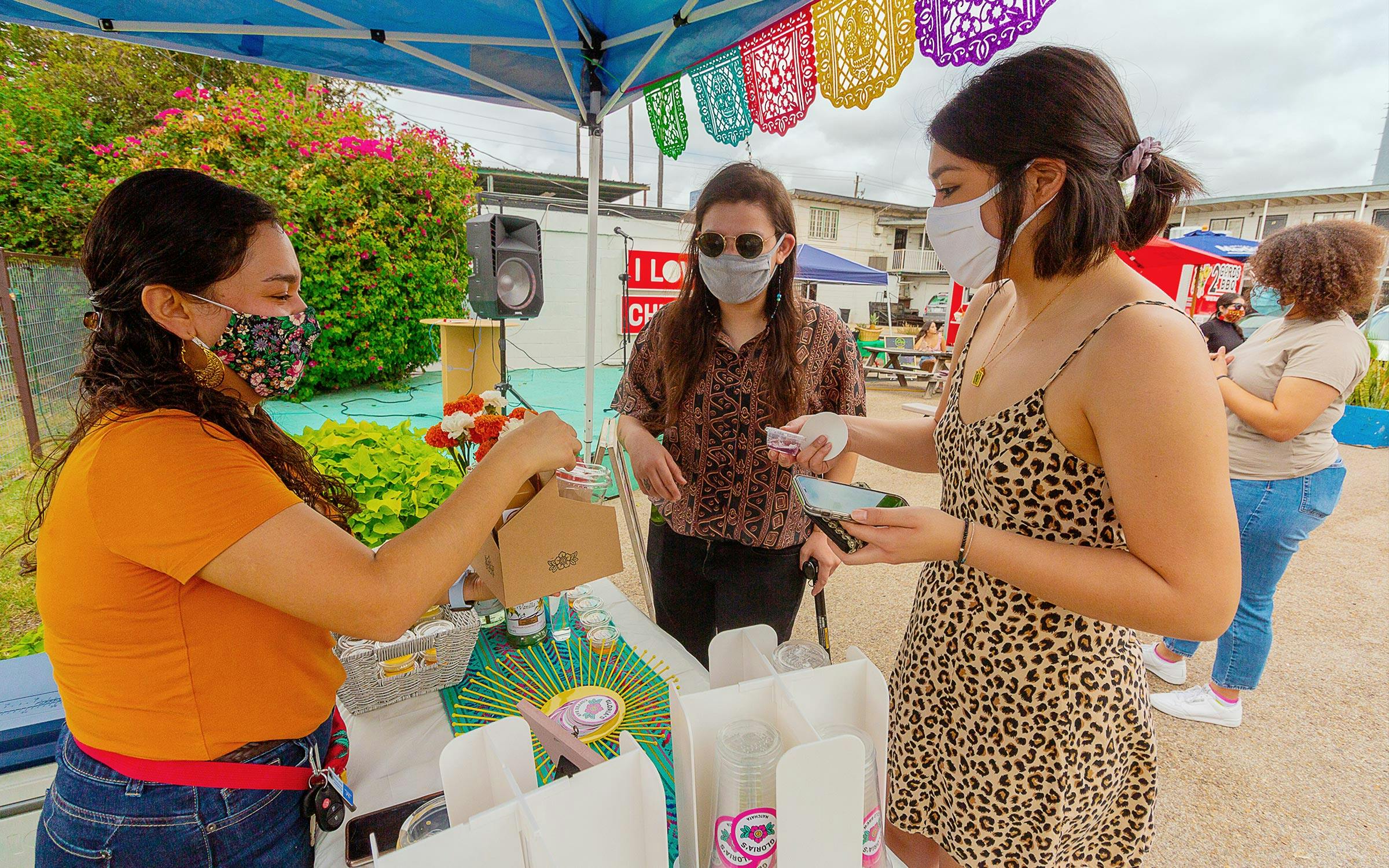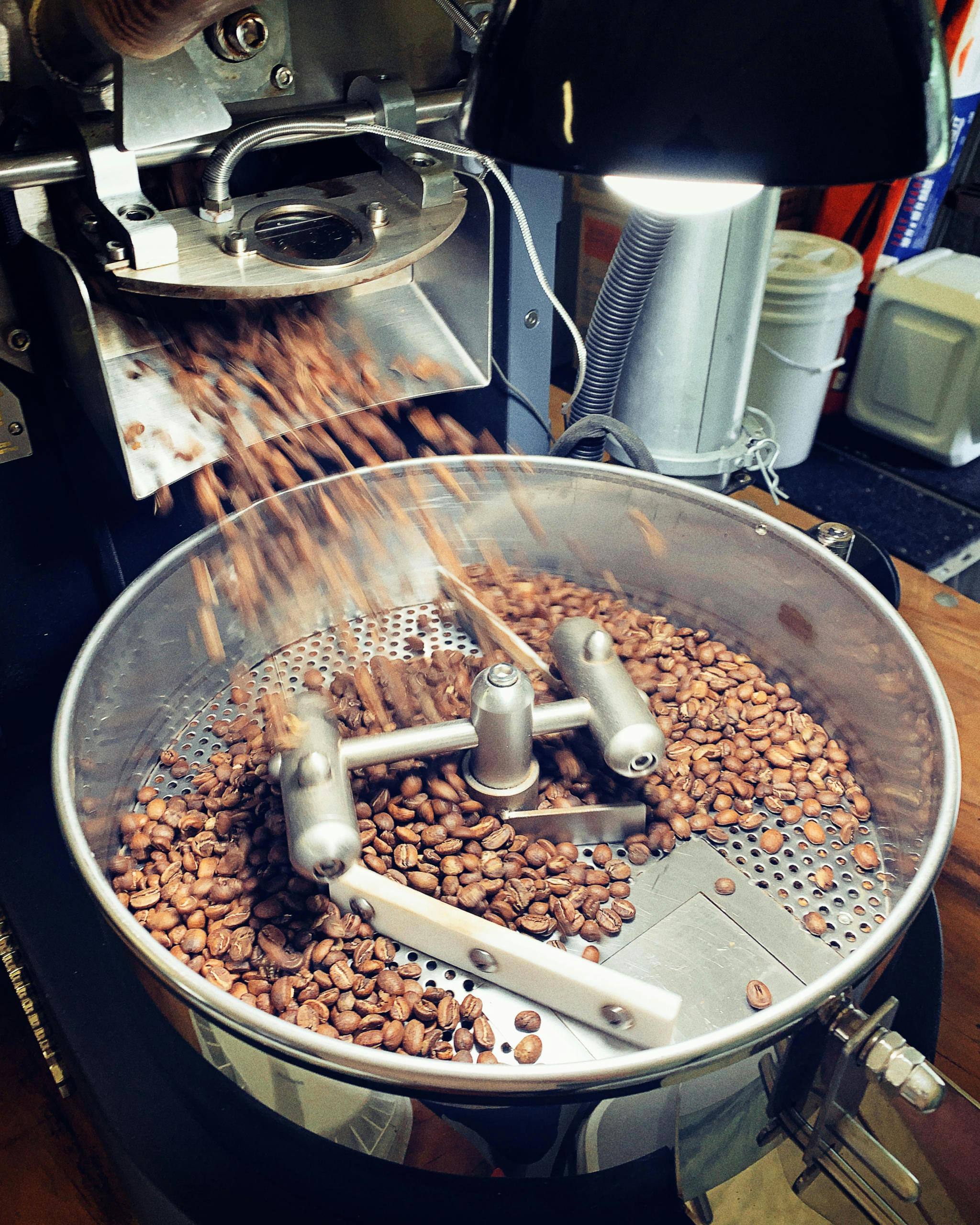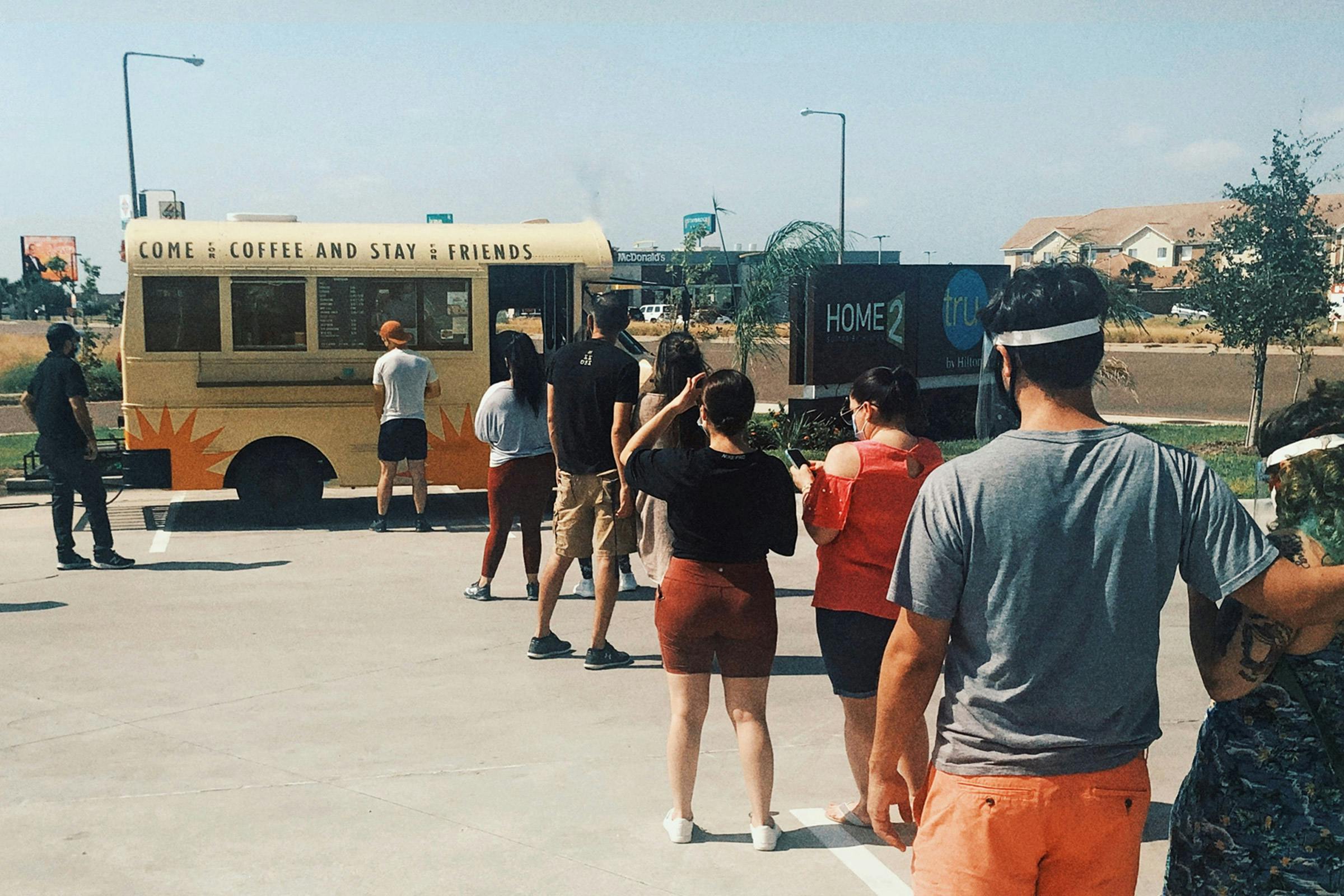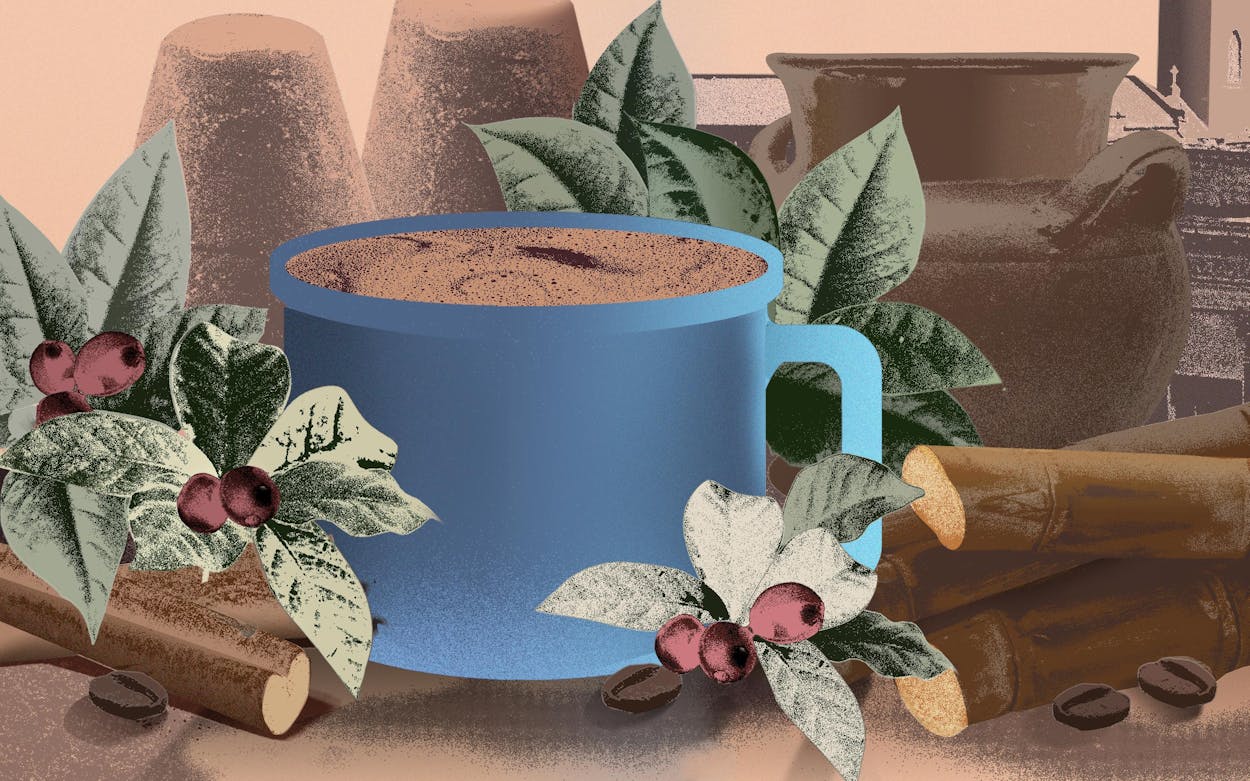At the Starbucks drive-through on Del Mar Boulevard in north Laredo, expect up to an hour’s wait in a line that can stretch out to fifteen cars. That’s on any day, at any time. “People already know,” one customer told me. “If you’re going to Starbucks, make sure you have gas.”
One explanation for Laredoans’ die-hard commitment to the brown stuff is cultural. Ask any resident about their first cup of coffee, and you’re likely to hear a story about a mischievous abuela sneaking cafecitos to their grandchildren when Mom and Dad weren’t looking, a piece of pan dulce on the side. “It was one of my favorite things ever,” says 23-year-old Emma Estrada, recalling the bolillo that she and her grandmother would dip into their cups together.
I’ve heard versions of this story over and over. Young Laredoans, unsure of how appropriate it was to be drinking coffee so young, but wistful and grateful for the memories of the tiny cups full of café, sugar, and milk. But there’s also a bizarre disconnect. Laredo, according to a 2016 study, is the least ethnically diverse metro area in the nation, with a 95.7 percent Hispanic population. That’s reflected in its rich food scene, which includes a jalapeño eating contest and the advent of the Taco Palenque pirata (two flour tortillas filled with fajitas, refried beans, and cheese). And yet, for years, the only consistent java in town was either a 99-cent cup from a corner store or corporate swill concocted in Seattle. There is no abuela-owned coffee shop serving authentic, small-batch brews inspired by the border. For Estrada, it was frustrating to see the lack of options. “We’ve had a lot of McDonald’s and a lot of Starbucks,” she says, “but nothing local.”
Indie coffee shops have come and gone, but only one has found enduring success: Organic Man Coffee Trike, a family-owned shop that opened in 2016 with an eclectic selection of drinks. Organic Man owner Martha Oviedo-Venegas is sympathetic to the plight of other local coffee entrepreneurs who have attempted to break through but ended up failing. “If we as a community don’t go out there and buy local, then our community is going to stay the same, with the big franchises,” she says.
The omnipresence of chain stores is partly to blame for Laredo’s coffee coma. Texas has 1,189 Starbucks locations, second only to California. In 2017, the Specialty Coffee Association found that 41 percent of Americans were drinking specialty coffee—that is, more expensive coffee roasted with beans that can be traced to their original source—every day, up from 14 percent in 2001. In Laredo, however, it has taken longer for boutique coffee culture to settle in. “You still have those salt-of-the-earth people who, even if they do have some money, they say, ‘Five dollars for coffee?! ¿Nombre, pa’ que?’” says Teclo Garcia, Laredo’s economic development director.

Laredo is the tenth-largest city in Texas and is swimming in students and professionals, some of whom were sipping coffee before they could talk. And yet coffee culture has foundered in Laredo, a majority Mexican American city without Mexican coffee—until now. With household income up 33 percent since 2010, according to Garcia, it seems that Laredoans now have not only the cultural connection to coffee but the means to sustain a cafe scene around it.
New business permits in Laredo have fallen this year, in part because of the pandemic, but a trio of new businesses are betting that 2020 is the year Laredoans are ready to get out of that Starbucks line. Laredo is experiencing a cafecito renaissance in the form of three new border-inspired shops—and so far, even during a pandemic, all have found success.
When I talk via FaceTime with Jenny Cantu, 26, owner of Gloria’s Coffee Bar, there are three things on the wall behind her: a picture of her grandmother with a small Mexican flag taped to it, her framed Texas A&M University–Corpus Christi degrees, and a sign that reads “Coffee keeps me going until it’s acceptable to drink wine.”
I’ve called Cantu to ask her about her three-week-old business, which she named after her grandmother. She has big dreams, all tied to reintroducing the Mexican flavors of her youth to the coffee-drinking masses. And those degrees? She paid for them with a job as a barista at the Corpus Christi–based Coffee Waves. For years, she tells me, the owners were welcoming of new recipe ideas. But when she pitched Latin flavors, such as using Mexican condensed milk in an espresso drink called a café bombón, they demurred.
“They didn’t think the Latin flavors would sell,” she says. “I thought, man, if they don’t let me do this here, I can probably do this somewhere else.”
Six years later Cantu is doing exactly that, brewing specialty coffee with flavors inspired by her Mexican heritage. She doesn’t yet have a storefront, and instead makes small batches of cold brew in her parents’ house before delivering them to customers. Thanks to Laredo’s ever-reliable chisme (“gossip”) machine, Cantu is now hand-delivering forty bottles of coffee a day across the city. Two weeks after opening, she’s already been able to repay all the credit card debt she incurred from her original investment in beans, stickers, and supplies.

Her best-selling drink, a cold brew take on cafe de olla, was a customer suggestion. Cáfe de olla, whose name translates as “pot coffee,” is traditionally brewed in a clay pot. It’s sweet yet earthy, and tinged with cinnamon and piloncillo, small cones of dark cane sugar. Cantu wasn’t convinced the drink would work without the essential clay pot, nor did she think the piloncillo would infuse correctly into cold coffee, but she tried it on a whim. “I thought it would be trash, but I tried it and my mind was blown,” she says.
A trip to a dulceria, or candy store, also provided inspiration for recipes Cantu hopes to eventually sell in a physical shop. On her menu, Mexican sweets like Duvalín, Bubu Lubu, and cajeta, or Mexican caramel, stand out next to more traditional fare. The tricolored Duvalín is replicated in a three-layered latte of vanilla-flavored milk, mocha coffee, and whipped strawberry cream on top. The chocolate- and jelly-covered marshmallow candy Bubu Lubu is reimagined as a frappé. Her signature drink, the La Gloria Latte, is inspired by the pecan and cajeta candies named Glorias. “I’m embracing the culture,” she says. “You can do anything with coffee, and I want to showcase that you can really make coffee your own.”
For Billy Hrncir, 30, there was no better way to make coffee his own than building Laredo’s first roastery.
Hrncir fell in love with the coffee industry while living in Puerto Rico, where his wife, Rochelle, attended medical school. The couple decided to return to the Gateway City to bring some of the island’s coffee culture back home.
In May 2019, Hrncir posted the logo for his new coffee business, Dosis, on Instagram. A play on “daily dose” and something you could say in Spanish and English, the logo—a flat sun peeking out over a traditional cafecito—radiated Austin hipster energy. Two days later, he posted it again, this time on a T-shirt for sale. The reaction was immediate. “That was crazy because at the time I had no roasting experience, nothing,” he laughs. “I was kind of like, ‘Wow, these people were ready for a product and I’ve … designed a T-shirt.”
The Hrncirs decided to start not with a cafe but with a roastery. After three months of construction, the 1,200-square-foot facility was completed on their East Laredo ranch in January. They focused on small-batch blends with beans sourced only from Latin America, a nod both to their time in Puerto Rico and to their roots on the Texas-Mexico border. The couple roasted batch after batch, giving away bags to friends, then taking their feedback to help hone their craft.
Satisfied with their product, they began selling under Texas cottage law, which limits sales to hand-delivered bags only. For months, Hrncir tried to persuade the health department to come inspect the roastery. “If we didn’t know no one else was roasting coffee in Laredo before, we sure as heck did when we were trying to get licensed,” he says. “The city of Laredo had no idea what we were doing.”

Hrncir finally received his state permit in March, but the victory was bittersweet. The pandemic hit and Laredo enacted some of the most stringent COVID-related restrictions in Texas, closing all nonessential businesses and implementing a stay-at-home order for two weeks. Luckily, the couple’s refurbished van turned mobile cafe, El Cortado, was ready to hit the road, so they started selling coffee and merch to go from a hotel parking lot by the airport. Business was slow at first. As word of mouth spread across social media, however, Hrncir began to see more and more defectors from Starbucks. “We’d have people who saw us on Facebook or Instagram and say, ‘I used to go to Starbucks every day, but now I’m coming here.’”
The final new—and only brick-and-mortar—coffee shop is Los Olvidados, located in the shadow of San Agustin Plaza in downtown Laredo. For owner Ricardo Segve, coffee is just a means to an end.
“I’ve always enjoyed coffee, but I’m not a coffee nerd at all,” Segve tells me. A Mexico native and former professional photographer, Segve teamed up with a friend, Alfredo (who declined to give his last name), to create a “mini cultural center.” Los Olvidados was born out of the desire to create a cultural space to facilitate dialogue and connections that, in their view, had fallen to the wayside. Los Olvidados opened in January, as a hybrid coffee shop/art gallery/thrift store/venue that feels decidedly crafty and radiates a do-it-yourself spirit.
All three new coffee ventures launched just before the full weight of the pandemic bore down on small business owners. Cantu and Hrncir, who don’t have to pay rent, told me they’re doing better than they expected and didn’t have to apply for any emergency loans. Segve applied for a loan but never heard back. With his shop open at 75 percent capacity and making enough money to pay the bills, Segve says he’s not concerned.
The owners agree that a younger crowd is driving the cafecito boom. For these customers, it’s clear that the experience of having a great cup of local coffee at a shop in Austin or San Antonio has led to the demand in Laredo. “Imagine you’re 22 and you get a great iced coffee that you can take a picture of somewhere else, and then you come back to Laredo and all we have is Starbucks,” says Cantu. “It’s not the same. Then you go to Dosis or Organic Man and it’s different, in a better way.”
Oviedo-Venegas, the owner at Organic Man Coffee Trike, says she’s glad to see the coffee scene growing. “Laredo is so big,” she says. “There are clients for everyone. We feel nothing but excitement because we feel like we’re all helping each other market coffee in Laredo.”
Time will tell how long the Laredo cafecito renaissance lasts and whether a continued and robust coffee culture can persevere, but for Hrncir, the choice is obvious. As he says, “It doesn’t make sense to me to not buy local coffee.”
Los Olvidados Coffee Shoppe & Gallery
309 Flores Avenue, Laredo
956-220-8189@losolvidadosltx
Gloria’s Coffee Bar
Order at gloriascoffeebar@gmail.com
@GloriasCoffeeBar
Dosis Coffee
7120 Rosson Road, Laredo
@dosiscoffeetx
- More About:
- Laredo






